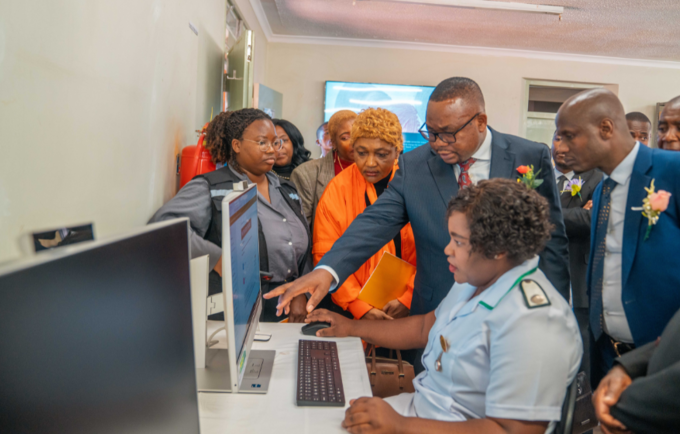Chinhoyi, Zimbabwe, 19 June 2024 - The United Nations Population Fund and the Ministry of Health and Child Care with support from the Health Resilience Fund (HDF) launched an E-Learning platform for all nurse and midwifery training institutions in Zimbabwe on the 20th of June 2024.
The advancement of technology platforms and internet availability has created opportunities for educationists to harness Information Communication Technologies for the improvement of education services. It is envisaged that the development of the E-Learning Platform will ensure among other things standardization of all learning content for all nursing and midwifery schools in Zimbabwe, enhance access to learning content by students through web and mobile platforms and enhance research and collaborations among students and tutors.
The setting of the E-Learning platform is part of the interventions being implemented under the HRF which is supported by the Governments of Britain, Ireland and the European Union. It builds from work that began through the Health Development which preceded the HRF.
Well trained and regulated midwives in an enabling environment can deliver about 90% of essential Sexual, Reproductive, Maternal, New-born and Adolescent Health (SRMNAH) interventions and avert about two thirds of all maternal and new-born deaths. Because of their role in pre-pregnancy, delivery and post-delivery care including management of complications of pregnancies, midwives significantly contribute to the reduction in maternal mortality.
In a speech read on his behalf by Minister of Skills Audit and Development Hon Paul Mavhima the Minister of Health and Child Care Dr. Douglas Mombeshora hailed the E-Learning platform as a “skills revolution” for Zimbabwe. He emphasized the critical need to embrace digital learning to advance healthcare and urged all to embrace digital learning to advance healthcare and ensure our nation thrives in the global economy.”
With an initial investment of USD 273,000, built on the Moodle framework, the platform is equipped to handle up to 2,000 users and comes complete with a range of teaching aids like discussion rooms, forums, anti-plagiarism software, quizzes, and exam formats. Funds have gone into securing licenses, capacity building for educators and the support team, and assessing the readiness of midwifery and nursing schools for e-learning. Further, the investment includes the procurement of 22 laptops, 77 desktop computers, 22 large TV screens and 22 LCD projectors.
While the immediate focus is on midwifery, the vision extends to incorporating other health workers onto the platform, ultimately strengthening the entire healthcare system. By reducing time away from work, eliminating travel costs, and minimizing reliance on printed materials, this investment promises to enhance workplace productivity and address challenges like staff attrition.
“ The Health Resilience Fund’s strategic focus is on sustainability and scalability of initiatives. The E-Learning Platform demonstrates potential for sustainable growth, poised to enhance healthcare service delivery,” said Roisin Rooney speaking on behalf of the HRF funding partners at the launch.
With this initiative, Zimbabwe is taking a significant step towards achieving universal healthcare coverage and empowering its midwives to provide the best possible care for mothers and newborns. The initial phase will focus on six pilot schools, with plans to expand the program nationwide in the coming years.
“UNFPA places midwives at the centre of our mission to achieve the three (3) transformative results: ending preventable maternal deaths, ending the unmet need for family planning, and ending gender-based violence and harmful practices,” said UNFPA Representative Ms. Miranda Tabifor.
She added: The UNFPA Midwifery Programme Strategy 2017-2030 underscores the critical need for Investing in Midwives including strengthening their skills and competencies. The launch of this platform is a testament to our commitment to these goals, and a tangible step towards empowering midwives with knowledge and the tools they need to provide comprehensive care.”

